
Dealing with a car accident in Oregon? Learn how a diminished value claim in Oregon can help you recover the loss in your vehicle’s value. This guide explains what diminished value claims are, how to file one, and tips for getting the best insurance settlement.
Key Takeaways
- Diminished value claims in Oregon allow vehicle owners to recover financial losses incurred due to a decrease in market value after an accident, even if the vehicle is repaired.
- To file a diminished value claim, it is crucial to prove the loss in value, often requiring a professional appraisal, and to understand the time limits and procedures involved in the claims process.
- Hiring a certified appraiser significantly increases the likelihood of a favorable settlement by providing credible assessments that support the claimed diminished value against tactics employed by insurance companies.
Understanding Diminished Value Claims in Oregon
Diminished value represents a hidden financial loss that many vehicle owners overlook after an accident. Even after thorough repairs, a car’s market value typically decreases because potential buyers are often wary of vehicles with a history of damage. In Oregon, understanding your right to file a diminished value claim can help you recover the lost value of your vehicle, ensuring you are not financially disadvantaged due to an accident.
The concept of Oregon diminished value claims is crucial for vehicle owners who suffer economic losses due to accidents. Filing a diminished value claim allows you to seek compensation for the reduction in your vehicle’s market value, so you are not left out of pocket.
This section will delve into what diminished value is, why cars lose value after an accident, and the legal basis for such claims in Oregon.
What is Diminished Value?

In Oregon, you can file a diminished value claim if you are not at fault for the accident. The extent of property damage directly correlates with the loss in value; the more severe the damage, the greater the drop in market value. For instance, a car that has suffered substantial damage will likely experience a significant reduction in its fair market value, even after extensive repairs. This economic loss is what a diminished value claim aims to recover.
Oregon law supports the right to claim diminished value, particularly under ORS 20.080, which allows for property damage claims. This means that if your vehicle has suffered diminished value due to an accident, you have a legal basis to seek compensation through a diminished value appraisal and subsequent claim.
Why Your Car Loses Value After an Accident
After a car accident, even a well-repaired vehicle typically experiences a decrease in market value due to the perception of previously sustained damage from an auto accident. Potential buyers often factor in the vehicle’s accident history when evaluating its worth, leading to hesitancy in making a purchase. This diminished value occurs because buyers generally prefer undamaged vehicles, believing them to be more reliable and safer.
Vehicle owners must understand diminished value to recognize the financial loss incurred during and after the claims process. The loss in value is not just a matter of perception but a real economic decline that affects your vehicle’s resale value. Recognizing this can empower you to take the necessary steps to recover the diminished your vehicle true market value through a diminished value claim.
Legal Basis for Diminished Value Claims in Oregon
Oregon case law provides strong support for recovering diminished value for damaged vehicles. Key points include:
- The legal precedent emphasizes the rights of vehicle owners in such situations.
- Under ORS 20.080, the maximum claim amount for diminished value is $10,000.
- This legal framework ensures that vehicle owners can seek compensation for the loss in market value even if their vehicle has been repaired.
- Oregon law allows you to file a diminished value claim within six years from the date of the incident, providing ample time to gather the necessary evidence and file your claim.
It’s also important to note that a vehicle declared a total loss will be compensated for its fair market value, which limits the possibility of a diminished value claim. You can file a diminished value claim even if you weren’t injured. The key requirement is that your totaled car must have sustained damage, which may affect its total loss value and the vehicle’s loss.
This legal basis ensures that vehicle owners are not left financially disadvantaged due to the diminished value of their repaired vehicles.
Let's Settle For More... Get Your FREE Case Review Today.
Let's Settle For More... Get Your FREE Case Review Today.
Steps to File a Diminished Value Claim in Oregon
Filing a diminished value claim in Oregon involves several crucial steps:
- Establish whether you or another party is at fault for the accident.
- If involved in a hit-and-run with an unknown at-fault driver, consider filing a diminished value claim with your own insurance company.
- Know the specific time limits for filing these claims to ensure your claim is processed within the permissible timeframe.
The process of filing a diminished value claim can take anywhere from 60 to 90 days to resolve, though in some cases, compensation can be recovered in as little as a month. Hiring an attorney can be beneficial as there are no upfront costs involved; you only pay if the case is won.
Additionally, prevailing party fees may cover most litigation costs if the case goes to court, ensuring that you are not financially burdened throughout the litigation process.
Proving Your Vehicle’s Loss in Value
Proving your vehicle’s loss in value is a critical step in filing a diminished value claim. This involves demonstrating the reduction in your vehicle’s worth following an accident, regardless of the repairs made. A vehicle’s damage history can significantly influence potential buyers’ perceptions and willingness to pay, making it essential to provide proof of the vehicle’s pre-loss value to support your claim.
A diminished value appraisal from a professional appraiser is often required to substantiate your claim. This appraisal provides a comprehensive assessment of the vehicle’s market value post-accident, considering factors like repair quality, accident history, and current market trends. Having comprehensive documentation, including a demand letter, can strengthen your negotiating position with the insurance company.
Many claimants struggle with providing sufficient evidence to support their diminished value claims, often leading to under-compensation. Professional appraisers play a crucial role in this process, as their thorough assessments ensure accurate valuations that reflect the true market value of your vehicle post-accident.
Filing the Claim with Insurance
Filing a diminished value claim involves submitting your claim to the at-fault party’s insurance company to recover the lost value of your vehicle. Alternatively, you can file a first-party claim with your own insurance company if the at-fault driver is unknown or uninsured. When filing the claim, the costs of hiring a Diminished Value Expert are covered, and you only pay for legal services if the claim is won.
A free claim review can provide:
- An initial assessment of your case helps you understand the potential compensation you may be entitled to.
- Guidance on the necessary steps to file your claim effectively.
- Assurance that all required documentation is in order.
Filing the claim promptly and accurately increases your chances of a successful outcome.
Negotiating a Fair Settlement
Negotiating a fair settlement for your diminished value claim often involves overcoming hurdles such as proving the loss in value and dealing with insurance companies’ tactics. Insurance companies aim to pay the least amount possible and may employ strategies to reduce compensation, such as undervaluing your claim. Utilizing professional appraisal services generally leads to higher settlements, as their assessments provide a credible basis for negotiation with insurers.
Engaging in litigation can be a lengthy process and should be considered only when fair compensation is denied. However, having a professional appraisal and comprehensive documentation can significantly strengthen your negotiating position, ensuring that you receive the fair compensation you deserve.
Remember, the initial offer from the insurance company is often lower than what you are entitled to, so being prepared to negotiate your own insurance policy is crucial for receiving a fair offer.
The Role of Auto Appraisers in Diminished Value Claims
Hiring a professional appraiser is crucial in accurately assessing the diminished value of your vehicle. Key benefits of professional appraisal services include:
- Significantly increased settlement amounts, as reported by clients
- Expert evaluations that are important in the claims process
- Precise assessments reflecting the true market value of your vehicle post-accident. These ensure you receive the compensation owed.
Choosing a certified appraiser in Oregon, understanding how appraisers determine diminished value, and recognizing the benefits of professional appraisal services will help you navigate the claims process more effectively and secure a fair settlement.
Choosing a Certified Appraiser in Oregon
A diminished value appraisal from a licensed expert is often required to substantiate your claim. Selecting an appraiser who is recognized by Oregon’s certification standards helps ensure adherence to legal requirements. Hiring an appraiser certified by Oregon’s Department of Transportation ensures compliance with state laws regarding vehicle valuations.
Choosing a certified appraiser not only provides credibility to your claim but also ensures that the appraisal report is accepted by the insurance company and, if necessary, the court. This step helps build a strong case for your diminished value claim.
How Appraisers Determine Diminished Value
Obtaining a certified car appraisal after an accident is crucial to determine the pre-loss value of a vehicle and reach a fair settlement. An appraisal from a diminished value expert can assist in quantifying the loss in value of your vehicle after repairs. Professional appraisers use a certified total loss appraisal report to accurately assess loss in value, ensuring that all aspects of the vehicle’s condition are taken into account.
Appraisal clauses in insurance policies are essential because:
- They allow parties to engage independent appraisers to resolve disputes regarding claim valuations.
- They can expedite the resolution process by involving appraisers from both the claimant and the insurer.
- The appraisers work together to agree on the vehicle’s value.
Benefits of Professional Appraisal Services
Clients have described appraisal services as providing:
- Precise evaluations, crucial for recovering owed compensation.
- Thorough assessments that significantly enhance the credibility of your diminished value claim.
- Expert assistance that can lead to settlements significantly higher than initial offers from insurance companies.
This is because professional appraisers provide detailed reports that accurately reflect the true market value of your vehicle post-accident, ensuring you receive the compensation you deserve.
A customer highlighted that the appraisal service was not only detailed but also instrumental in securing the compensation owed. This underscores the value of professional appraisal services in the claims process. By hiring a licensed appraiser, you can ensure that your claim is well-supported and that you are in a strong position to negotiate a fair settlement.
Common Challenges in Diminished Value Claims
Filing a diminished value claim can be fraught with challenges. One of the primary obstacles is dealing with insurance companies that often employ tactics to minimize payouts. These companies may undervalue vehicle damages or propose significantly lower compensation offers to reduce their financial liability. Being aware of these tactics and preparing to counter them effectively is crucial.
Understanding appraisal clauses in insurance policies and knowing when to consider litigation as a last resort are also crucial in navigating the claims process. These aspects will be discussed in the following subsections to equip you with the knowledge to overcome common challenges and secure the compensation you deserve.
Dealing with Insurance Company Tactics
Insurance companies may employ various strategies to minimize payouts, including:
- Undervaluing vehicle damages
- Proposing significantly lower compensation offers
- Preferring not to disclose that diminished value claims can be filed, creating obstacles for policyholders
- Challenging claims by arguing that no value was lost due to the satisfactory repairs
Countering these tactics requires:
- Providing comprehensive documentation and a professional appraisal to substantiate your claim.
- Being prepared to negotiate.
- Engaging in litigation, if necessary, to ensure fair compensation for your vehicle’s diminished value and to compensate for any losses incurred.
Understanding Appraisal Clauses in Insurance Policies
Appraisal clauses are provisions in insurance policies that outline the process for resolving disputes over the value of a claim. These clauses allow both parties to engage independent appraisers to assess the vehicle’s value, ensuring a fair and accurate valuation. By involving appraisers from both the claimant and the insurer, the appraisal clause can lead to a more accurate valuation of a claim, significantly affecting the settlement amounts in diminished value claims.
Understanding and utilizing appraisal clauses can expedite the resolution process and provide a more balanced outcome. This knowledge helps navigate the claims process and ensures your claim is fairly assessed.
Litigation as a Last Resort
Litigation should be pursued if the insurance company refuses to offer fair compensation. During litigation, both parties will present evidence and arguments to a judge or jury to resolve the dispute. While this process can be lengthy and costly, it may be necessary to secure the compensation you deserve.
Weighing the potential benefits and drawbacks of litigation is important before proceeding. Consulting with an attorney can help you determine the best course of action and ensure that you are adequately prepared for the legal process, minimizing any risk involved.
Frequently Asked Questions
What is diminished value?
Diminished value refers to the decrease in a vehicle’s market value following an accident, regardless of repairs made, caused by the stigma associated with past damage. This concept highlights the financial impact on vehicle owners post-collision.
Can I file a diminished value claim if I was not at fault for the accident?
Yes, you can file a diminished value claim if you were not at fault for the accident, particularly in Oregon. This means you may be entitled to compensation for the decreased value of your vehicle post-accident.
How do I prove my vehicle’s loss in value?
To prove your vehicle’s loss in value, gather evidence of its pre-accident valuation, obtain a professional diminished value appraisal, and submit thorough documentation to your insurance company. This approach will strengthen your claim and facilitate a fair assessment.
What are appraisal clauses in insurance policies?
Appraisal clauses in insurance policies serve as mechanisms for settling disputes regarding claim valuations by engaging independent appraisers from each party. This ensures an impartial assessment of the loss and facilitates an equitable resolution.
When should I consider litigation for my diminished value claim?
You should consider litigation for your diminished value claim when the insurance company refuses to provide fair compensation. Consulting with an attorney can further clarify your options and strategies moving forward.
Last updated Wednesday, September 24th, 2025






